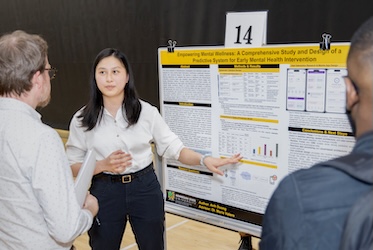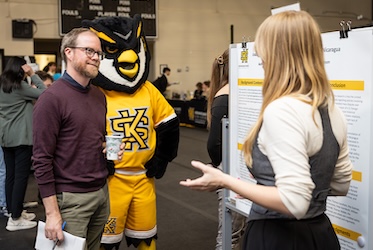
Kennesaw State faculty study shows potential effects of presidents’ use of Twitter
KENNESAW, Ga. | Jun 9, 2023
Twitter can influence American standing in the world when one of its 350 million users is the U.S. president, a study from Kennesaw State University suggests.
Political science professors Stephen Collins and Jeff DeWitt studied the influence of the tweets of former presidents Barack Obama and Donald Trump on U.S. image and “soft power” on the world stage. They were the first U.S. presidents to use the social media platform.

"While we are unable to demonstrate that presidential communication on Twitter is the sole explanation, our analysis shows that tweets published by Trump contained attributes, in terms of substance and tone, which would tend to jeopardize soft power,” DeWitt said. “At the same time, evidence from polls and independent organizations reveals a clear erosion of soft power during Trump’s presidency relative to Obama’s.”
Soft power describes a nation’s ability to encourage and persuade other nations’ governments and people to support its objectives.
For their study, published recently in the quarterly World Affairs journal, the researchers categorized the content of tweets as “statesmanlike, combative or neutral,” as well as how the tweets discussed topics of “global priority” like the importance of democratic institutions and environmental awareness.
Collins and DeWitt examined the last six months of Obama’s presidency and the first six months of Trump’s term, using both their personal and presidential Twitter accounts. The researchers concluded that out of the more than 2,000 presidential tweets during the study period, more than 60% of Trump’s tweets were likely to erode soft power, while about 35% supported it. By contrast, the study found nearly all Obama tweets supported soft power.
The study points out that the two presidents used Twitter in different ways. Obama tweeted as a means of promoting and supporting administration policies that had been reported by news outlets. Trump used Twitter to directly announce policy positions and his decisions to the public.
Also of note was the propensity for media to highlight Trump tweets more than Obama tweets during their respective presidencies, which the researchers said may have had an impact on soft power by sheer amount of coverage.
"We did not code tweets as building or eroding soft power based on how we think about the issues discussed, but rather on what the survey data - from Pew Research and the World Values Survey - reveals about world opinion on these matters,” Collins said. “One of the lessons that we hope is a takeaway from our paper is that presidents, when using social media, should pause and reflect upon the statements they make and how they are likely to be perceived by the world.”
Collins and DeWitt said with a 2024 presidential election looming, they hope their paper can help leaders and citizens alike consider how statements made by those in power can influence prosperity and security.
– By Thomas Hartwell
Photos by Darnell Wilburn
Related Stories

Passions spark innovation at Kennesaw State Symposium of Student Scholars

First-year Kennesaw State student, author recognized as versed local historian

Kennesaw State students to present research at Symposium of Student Scholars

Chemistry student engaged in sustainable catalyst research through Kennesaw State's First-Year Scholars program
A leader in innovative teaching and learning, Kennesaw State University offers undergraduate, graduate, and doctoral degrees to its more than 47,000 students. Kennesaw State is a member of the University System of Georgia with 11 academic colleges. The university’s vibrant campus culture, diverse population, strong global ties, and entrepreneurial spirit draw students from throughout the country and the world. Kennesaw State is a Carnegie-designated doctoral research institution (R2), placing it among an elite group of only 8 percent of U.S. colleges and universities with an R1 or R2 status. For more information, visit kennesaw.edu.














